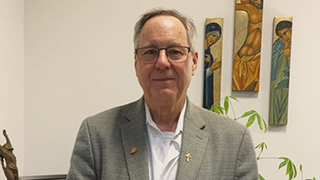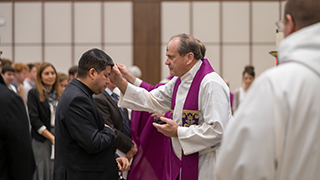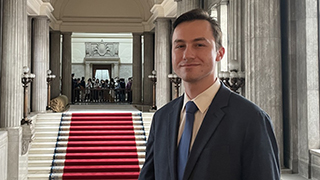Inside the Core
Wednesday, January 22, 2025
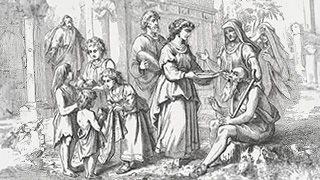
Illustration of Matthew 25:40 -feeding the hungry
Inside the Core this week, the first full week of the spring semester of 2025, two things converge that are profoundly related. All the Core II classes, the majority of the sections we run in the spring, are studying early Christian texts, namely from the New Testament, first Corinthians or the first letter of John, as well as writings by Tertullian, Justin Martin and Perpetua. In fact, our first Core Faculty Development will occur this week with faculty who contributed to the book Saints Perpetua, Felicity and their Fellow Martyrs, eds. Enright and Hunter (Lexington, 2024) and who will be sharing their scholarship with their faculty colleagues. Todd Stockdale, Ph.D., Coordinator of Core II, is one of these contributors, and he is coordinating the session. We featured this work, near to my heart, in Inside the Core earlier last year when we held a Scholars’ Forum about it. Studying these texts coincides with Martin Luther King Day and with our wonderful Seton Hall MLK Symposium held on that day, with many important presentations, and featuring a keynote address by Drew Hart Ph.D., associate professor of Theology at Messiah University.
What do these things – Martin Luther King Day, the King Symposium and the early Christian texts—have in common? Dr. King, all the presenters at the King Symposium, and the early Christians as a whole and as reflected in the texts we read in the Core advocate as normal to Christian faith a focus on the marginalized, an active faith that takes caring for the poor, the orphans, the strangers, the prisoners, as central to being a Christian. In Core I, we read King’s final sermon, “The Mountaintop Speech,” where he talks about the parable of the Good Samaritan depicting two people, the priest and the Levite, who walk past a man injured by robbers, thinking as King imagines it: “If I stop to help this man, what will happen to me?” and then King continues, “But then the Good Samaritan came by. And he reversed the question: ‘If I do not stop to help this man, what will happen to him?’” advocating the Samaritan as an example of a “dangerous unselfishness.” In the same vein, the writings of the early Christian authors studied in the Core reflect a values-centered, other-oriented faith that took for granted the fact that loving one’s neighbor, as enjoined in the ancient Jewish commandment “Love your neighbor as yourself” (Matthew 22:39), which Jesus identified as one of the two commandments that are most important, the other being, “‘Love the Lord your God with all your heart and with all your soul and with all your mind” (Matthew 22:37), was the hallmark of being a Christian. In fact, first John emphatically makes the point about how the two commandments are linked: “Whoever claims to love God yet hates a brother or sister is a liar. For whoever does not love their brother and sister, whom they have seen, cannot love God, whom they have not seen. And he has given us this command: Anyone who loves God must also love their brother and sister” (1 John 4: 20-21).
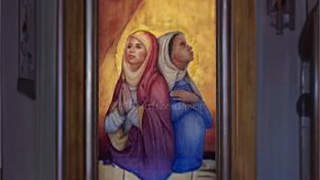
Saints Perpetua and Felicity
In light of these values, it is interesting to read, particularly at the start of the year and during a time of great change in our country, what the early Christians taught about the end times, the eschatological vision that informed them and animated them during great suffering (suffering detailed in Perpetua’s Passio most powerfully as this young mother of 22 awaited execution in a Roman North African prison with her fellow martyrs). In looking for an early Christian text on the subject of eschatology, I found On the End of the World by St. Hippolytus or “Pseudo-Hippolytus” (as scholars have some disagreement on whether the actual Hippolytus wrote this text or another early Christian writer). Regardless of that, this text is an early Christian reflection conveying one thing very clearly (as described in Matthew 25 by Jesus) -- the central role that love of neighbor, particularly for the poor and marginalized, will play at the final judgment of the nations. The early Christian writer (included among the ante-Nicene Fathers, writing in perhaps the early third century), elaborated on the famous parable of the sheep and the goats that Jesus used to illustrate how the righteous and unrighteous would be divided at the last judgement, and I quote at some length as it is extremely interesting and relevant to our world today.
At last the assembly is dissolved, the spectacle of this life ceases: its deceit and its semblance are passed away. Cleave to me, to whom every knee bows, of things in heaven, and things on earth, and things under the earth. For all who have been negligent, and have not shown pity in well-doing there, have nothing else due them than the unquenchable fire. For I am the friend of man, but yet also a righteous Judge to all. For I shall award the recompense according to desert; I shall give the reward to all, according to each man's labour; I shall make return to all, according to each man's conflict. I wish to have pity, but I see no oil in your vessels. I desire to have mercy, but you have passed through life entirely without mercy. I long to have compassion, but your lamps are dark by reason of your hardness of heart. Depart from me. For judgment is without mercy to him that has showed no mercy.
Then shall they also make answer to the dread Judge, who accepts no man's person: Lord, when saw we You an hungered, or thirsty, or a stranger, or naked, or sick, or in prison, and ministered not unto You? Lord, do You know us not? You formed us, You fashioned us, You made us of four elements, You gave us spirit and soul. On You we believed; Your seal we received, Your baptism we obtained; we acknowledged You to be God, we knew You to be Creator; in You we wrought sights, through You we cast out demons, for You we mortified the flesh, for You we preserved virginity, for You we practiced chastity, for You we became strangers on the earth; and You say, I know you not, depart from me! Then shall He make answer to them, and say, You acknowledged me as Lord, but you kept not my words. You were marked with the seal of my cross, but you deleted it by your hardness of heart. You obtained my baptism, but you observed not my commandments. You subdued your body to virginity, but you kept not mercy, but you did not cast the hatred of your brother out of your souls. For not every, one that says to me, Lord, Lord, shall be saved, but he that does my will. And these shall go away into everlasting punishment, but the righteous into life eternal.
(Hippolytus (or Pseudo-Hippolytus), On the End of the World, translated by J.H. MacMahon. From Ante-Nicene Fathers, Vol. 5. Edited by Alexander Roberts, James Donaldson, and A. Cleveland Coxe. (Buffalo, NY: Christian Literature Publishing Co., 1886.) Revised and edited for New Advent by Kevin Knight.
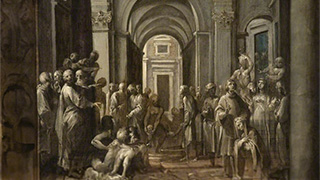
Giuseppe Cesari, St. Lawrence distributing food to the poor, circa 1588
The author is emphasizing what Jesus Himself said, in many contexts, but certainly in this parable of the sheep and the goats in Matthew 25 – loving God means also loving one’s neighbor, particularly the most vulnerable and needy. The author also echoes the warning Jesus gives elsewhere in Scripture: “Not everyone who says to Me, ‘Lord, Lord,’ will enter the kingdom of heaven, but he who does the will of My Father who is in heaven will enter” (Matthew 7:21). Saving faith changes us. While it is true, we do not earn heaven by good works, the early Christians clearly believed that to know Christ truly has to lead to love of neighbor, or it is not genuine. The passage from Hippolytus concludes with an emphasis on grace and faith, encouraging believers to live according to the light of God’s teaching about love of neighbor and love of God, “so that to us also the merciful and benignant God may say, ‘Your faith has saved you, go in peace'...”
The early Christians, whom we study in the Core this week, just like Martin Luther King, Jr., lived in the light of a powerful love that demanded action, and saw everyone, particularly the poor and marginalized, as brothers and sisters. For them, it was all part of a genuine faith that recognized in “the least of these” the face of Christ. As we study the early Christian texts, we need to keep in mind the timelessness of these beliefs and how, as Dr. King recognized, a genuine Christian faith, and we might say a genuine religious faith of any kind, involves love in action in the year 225 or in 2025.
Categories: Faith and Service


